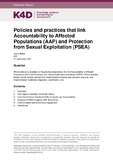| dc.contributor.author | Bolton, Laura | |
| dc.date.accessioned | 2021-12-03T09:20:02Z | |
| dc.date.available | 2021-12-03T09:20:02Z | |
| dc.date.issued | 2021-09-21 | |
| dc.identifier.citation | Bolton, L. (2021). Policies and practices that link Accountability to Affected Populations (AAP) and Protection from Sexual Exploitation (PSEA). K4D Helpdesk Report 1046. Brighton, UK: Institute of Development Studies. DOI: 10.19088/K4D.2021.138 | en |
| dc.identifier.uri | https://opendocs.ids.ac.uk/opendocs/handle/20.500.12413/16985 | |
| dc.description.abstract | This report show that largely protection from sexual exploitation (PSEA) is incorporated into accountability for affected population (AAP) policy and practice. In 2014 the Inter-Agency Standing Committee (IASC) merged two task forces on these into one. IASC look at linkages between AAP and PSEA processes highlighting that: risks of SEA should be understood and mitigated within AAP; feedback and complaints processes can be used for both areas; information for communities should be provided so that they know what behaviour to expect from aid workers in all areas; affected people should feed into SEA survivor packages
The general consensus across organisations is that SEA constitutes the most serious breach of AAP. The Core Humanitarian Standard (CHS) Alliance published a PSEA index mapping CHS verification indicators with PSEA requirements. Documented experience of using this and other policies and tools were not identified within the scope of this report. More is needed in the humanitarian community to report practical experience in linking AAP and PSEA Agency documents on AAP include PSEA as core components.
PSEA is suggested to be included in messaging at the onset of emergencies. Communities should be engaged with understanding their rights and how to act if their rights have been breached. Training is required for agencies to provide confidential, trusted and safe referral. Having a PSEA focal point is recommended. | en |
| dc.description.sponsorship | FCDO (Foreign, Commonwealth and Development Office) | en |
| dc.language.iso | en | en |
| dc.publisher | Institute of Development Studies | en |
| dc.relation.ispartofseries | K4D Helpdesk Report;1046 | |
| dc.rights.uri | https://www.nationalarchives.gov.uk/doc/open-government-licence/version/3/ | en |
| dc.subject | Gender | en |
| dc.subject | Sexuality and Development | en |
| dc.subject | Social Protection | en |
| dc.title | Policies and Practices that Link Accountability to Affected Populations (AAP) and Protection from Sexual Exploitation (PSEA) | en |
| dc.type | Helpdesk | en |
| dc.rights.holder | © Crown copyright 2021 | en |
| dc.identifier.doi | 10.19088/K4D.2021.138 | |
| rioxxterms.funder | Default funder | en |
| rioxxterms.identifier.project | K4D | en |
| rioxxterms.version | VoR | en |
| rioxxterms.versionofrecord | 10.19088/K4D.2021.138 | en |
| rioxxterms.funder.project | 0986883a-6d0f-4bb8-9c46-5e0682934d65 | en |

